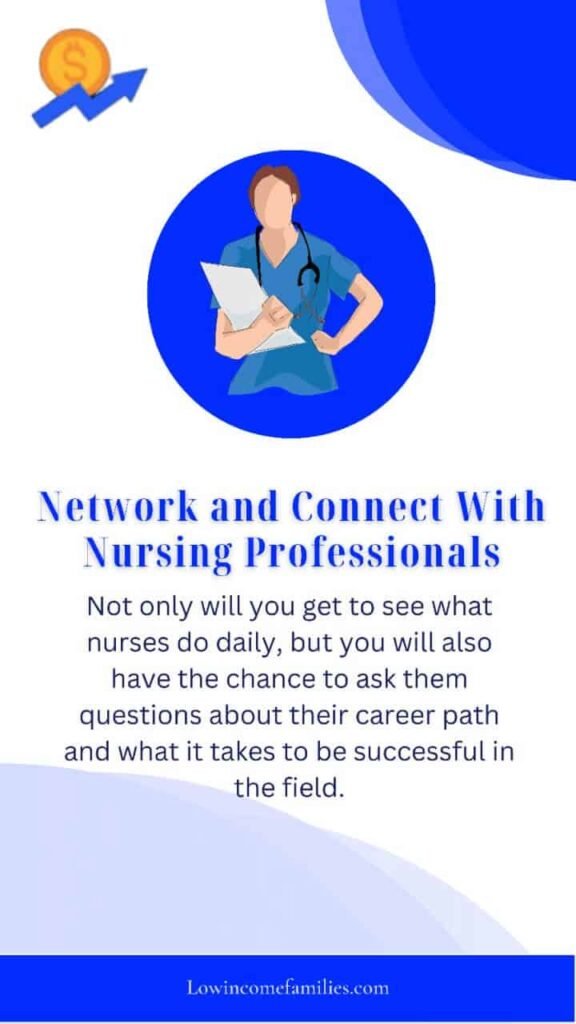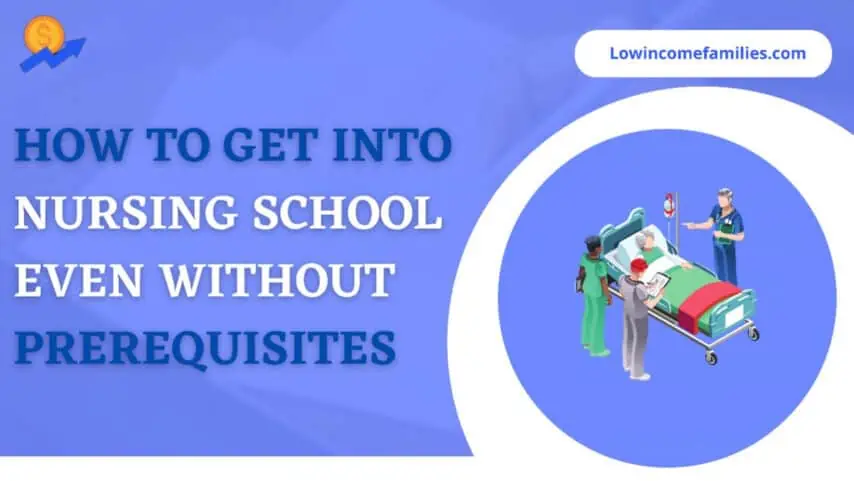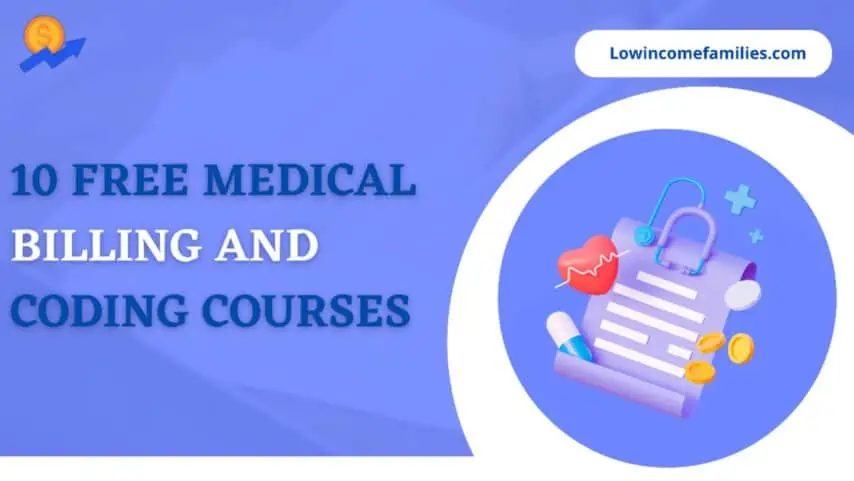Are you considering a career in nursing but feeling discouraged because of the lack of prerequisites? Not to worry! In this article, we’ll be exploring ways how to get into nursing school even without having to take additional courses or training.
There are pathways available that don’t require taking extra classes to get you into the school you want. Read on to learn more!
4 Ways To Get Into Nursing School Without Prerequisites
Nursing school is a popular choice for many students, but it can be difficult to get into without the right prerequisites.
However, there are ways to get into nursing school even without the prerequisites. Here are a few tips :-
-
Look For Schools That Offer Conditional Admission
Some nursing schools offer conditional admission to students who don’t have all the traditional prerequisites. This means that you may be able to take some lower-level courses before starting the nursing program. Check with individual schools to see if this option is available.
-
Get Your Foot In The Door With An Associate’s Degree
Many nursing programs require students to have a bachelor’s degree, but you may be able to get started with an associate’s degree instead.
Once you’ve completed your associate’s degree, you can then transfer into a bachelor’s degree program. This can be a great way to save time and money on your education.
-
Consider An Accelerated Program
If you already have a bachelor’s degree in another field, you may be able to complete a nursing program in as little as 12 months through an accelerated program. These programs are designed for working adults and often offer evening and weekend course options.
-
Start At A Community College
Community colleges offer many of the same courses as four-year universities, but they’re often less expensive and easier to get into.
You can usually transfer credits from a community college to a four-year university, making it easier to continue your studies if you decide to pursue a bachelor’s degree in nursing later.
By following these tips and doing some research, you’ll be able to get into nursing school even without the traditional prerequisites.
There are plenty of ways to make your education more accessible and affordable so that you can achieve your dream of becoming a nurse. With determination and perseverance, anything is possible!
Check Also: Free medical billing and coding course
What Is Nursing School And What Are the Prerequisites?
There are many different types of nursing schools, each with its own set of prerequisites. It is important to research the nursing school you are interested in attending to make sure you have the necessary qualifications.
Some common prerequisites for nursing school include :-
- A high school diploma or equivalent.
- A minimum GPA (usually 2.5 or higher).
- SAT or ACT score (depending on the school).
- Completion of certain prerequisite courses, such as math, English, and science.
- Letters of recommendation.
Prerequisites for nursing school can vary depending on the type of program you are interested in. For Example, some programs may require you to have a bachelor’s degree in another field before applying, while others may not have any specific requirements.
It is important to do your research to make sure you are meeting all the requirements for the program you wish to enter.
Check Also: How to get scholarship for blue eyes people?
How To Get Into Nursing School Without Prerequisites?
So you want to be a nurse but don’t have any prerequisites for nursing school? Don’t worry, it is still possible to achieve your dreams of becoming a nurse.
Here are a few tips on how to get into nursing school without prerequisites :-
-
Consider An Accelerated Nursing Program
These programs are designed for students who have a bachelor’s degree in another field and want to become Registered Nurses (RN). Most of these programs can be completed in 12-18 months and do not require any prerequisite coursework.
-
Get Your RN license
If you are already a licensed RN, you may be able to bypass the traditional nursing school route altogether and attend an RN-to-BSN or RN-to-MSN program. These programs are typically shorter and less expensive than traditional nursing programs.
-
Earn College Credit Through Work Or Life Experience
Many colleges offer credit for prior learning, which can include work experience, military service, or other life experiences. This credit can be used to satisfy prerequisite course requirements for nursing school.
-
Challenge The Prerequisite Courses
Some colleges offer the option to challenge prerequisite courses by taking a proficiency exam. If you pass the exam, you will earn credit for the course and will not be required to take it again.
-
Speak With An Admissions Counselor
Admissions counselors at nursing schools can guide you on how to apply without prerequisites. They may also know of alternative programs or be able to direct you to resources that can help.
Getting into nursing school without prerequisites is possible, but it requires some extra effort. If you’re willing to put in the time and effort, you can still become a nurse and make your dreams a reality.
Explore Opportunities Through Accredited Schools
There are many ways to become a nurse, but most involve completing an accredited nursing program. Nursing programs are typically two to four years in length and lead to an associate’s or bachelor’s degree in nursing.
Some nurses may also choose to pursue a master’s degree or doctorate in nursing. Nursing programs generally include coursework in the sciences, such as anatomy and physiology, as well as clinical experience through practicums or internships.
Many nursing schools also require students to take courses in liberal arts and the humanities. Students interested in becoming a nurse should research various nursing programs to find one that best fits their interests and needs.
Tap Into Non-Traditional Learning Programs
There are many non-traditional learning programs available to individuals interested in becoming a nurse. These programs can be found at community colleges, online schools, and even some traditional four-year universities.
Many of these programs offer flexible schedules and accelerated courses that allow students to complete their nursing education in a shorter time frame than traditional programs.
Some of the most popular non-traditional learning programs include :-
-
Diploma Programs
Diploma nursing programs are typically offered at community colleges and take about three years to complete. Students in these programs take a mix of general education courses and nursing coursework.
Upon completion, students are eligible to take the NCLEX-RN exam and become licensed registered nurses.
-
Associate Degree Programs
Associate degree nursing programs can be found at both community colleges and some four-year universities. These programs usually take two years to complete and include a mix of general education courses and nursing coursework.
Students who complete an associate degree program are eligible to take the NCLEX-RN exam and become licensed registered nurses.
-
Bachelor’s Degree Programs
Bachelor’s degree nursing programs are offered at both four-year universities and some online schools. These programs typically take four years to complete and include a mix of general education courses, Nursing Theory coursework, and clinical rotations.
Students who complete a bachelor’s degree program are eligible to take the NCLEX-RN exam and become licensed registered nurses.
-
Master’s Degree Programs
Master’s degree nursing programs are offered at both four-year universities and some online schools. These programs typically take two years to complete and include a mix of advanced Nursing Theory coursework, clinical experiences, research projects, and specialty courses.
Students who complete a master’s degree program are eligible to take the NCLEX-RN exam and become licensed registered nurses with an advanced practice specialty.
-
Doctorate Degree Programs
Doctoral degree nursing programs are offered at four-year universities and some online schools. These programs typically take three to five years to complete and involve research projects, clinical experience, specialty courses, and dissertation research.
Upon completion of the program, students are eligible to take the NCLEX-RN exam and become licensed registered nurses with an emphasis on advanced practice or research.
No matter which non-traditional learning path you choose to become a nurse, it is important to make sure that your program is accredited by either the Accreditation Commission for Education in Nursing (ACEN) or the Commission on Collegiate Nursing Education (CCNE).
Network And Connect With Nursing Professionals
One of the most important things you can do when trying to get into nursing school is to network and connect with nursing professionals. This can be done in several ways, such as attending nursing career fairs, joining professional organizations, or shadowing a nurse.

When you attend nursing career fairs, you will have the opportunity to meet with representatives from different nursing programs and learn about their admissions requirements. This is a great way to learn about different program options and find out which ones might be a good fit for you.
Joining professional organizations like the National Student Nurses Association (NSNA) is another great way to connect with nursing professionals. As a member, you will have access to resources and networking opportunities that can help you in your journey to becoming a nurse.
Finally, shadowing a nurse is an excellent way to gain first-hand experience of what the profession is really like.
Not only will you get to see what nurses do daily, but you will also have the chance to ask them questions about their career path and what it takes to be successful in the field.
Are There Different Prerequisites For Each Nursing Degree?
The field of nursing offers many different degree options, from entry-level positions to advanced practice roles. While the specific prerequisites for each degree may vary slightly, there are a few general requirements that all nursing students must meet before being accepted into a nursing program.
Prospective students must first complete a high school diploma or equivalent. They must then take and pass the National League for Nursing’s (NLN) required prerequisite courses, which include English composition, math, humanities/social sciences, and natural sciences/biology.
Once these requirements have been met, students can begin the process of applying to their desired nursing program. Some programs may have additional prerequisites beyond the NLN’s requirements.
So it is important to check with your desired school to see what their specific admission requirements are. In most cases, however, if you have completed the NLN’s prerequisite courses and have a high school diploma or equivalent, you should be eligible for admission into most nursing programs.
Conclusion :-
Nursing school is a rigorous and demanding process. As such, being sure you are prepared for the journey ahead of you is vital to success. Even if you don’t meet all the prerequisites for admission into nursing school, there are still many other ways to get your foot in the door.
By researching the available options, seeking out letters of recommendation, and applying yourself to volunteer work or certification programs that might be beneficial upon application time; nursing school can become a reality even without all of those prerequisite courses having been taken beforehand.
Frequently Asked Questions
I don’t have any prerequisite courses, can I still get into nursing school?
YES! Not all schools require prerequisite courses and some schools offer alternate routes for students without them. Talk to a few different schools to see what your options are.
What are some ways I can make myself a more competitive applicant?
There are a few things you can do: gain healthcare experience, get strong grades in your prerequisite courses (if you have them), score well on the nursing entrance exam, and write a great application essay.
How long does it take to become a registered nurse?
It generally takes two to four years to complete an accredited nursing program and pass the NCLEX-RN licensing exam.
What is the NCLEX-RN?
The National Council Licensure Examination for Registered Nurses (NCLEX-RN) is a standardized exam administered to determine if someone has the knowledge and experience needed to become a registered nurse.
Is financial aid available for nursing school?
Yes, there are various forms of financial aid available to help pay for your education. This includes student loans, grants, scholarships, and work-study programs. Visit your school’s financial aid office or check with local organizations in your area to see what resources are available.












